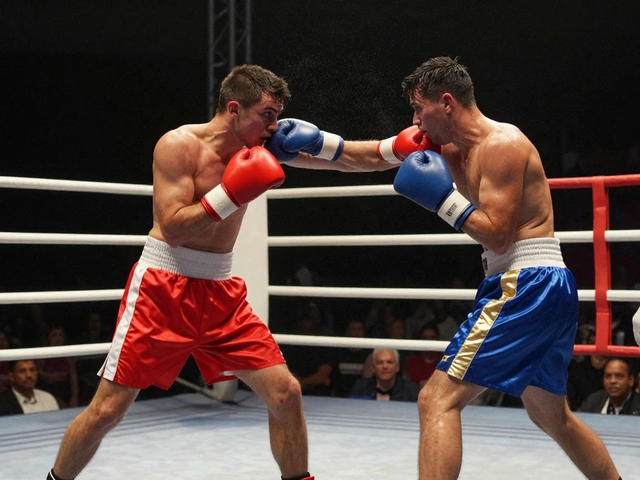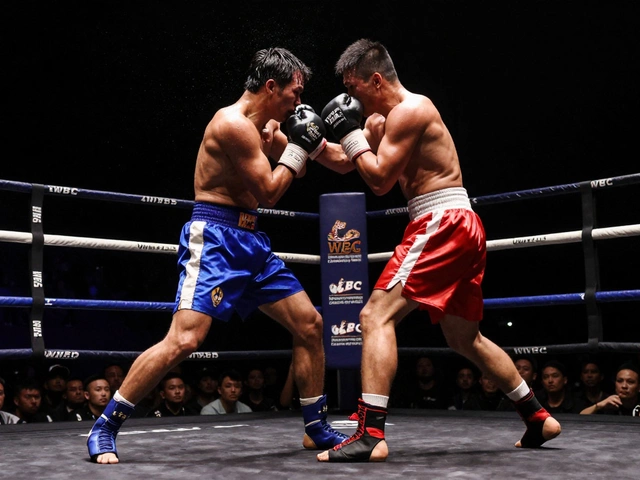“Fight night” or “throwdown”—bet you’ve heard these tossed around when people talk about a boxing match. But what do they all really mean? Boxing has a whole world of slang, and it changes depending on where you are and who you’re talking to. Understanding this lingo isn’t just for big-name commentators; it’s how real fans and fighters connect, joke, and sometimes even show respect.
People don’t usually call it just “the fight” either. In gyms or lively bars, you’ll hear folks talk about “the scrap,” “the bout,” “duel,” or even a good old-fashioned “rumble.” Slang can even depend on the atmosphere. Big-money events are sometimes called “showdowns,” while an ordinary televised fight might just be a “card.” Ever hear someone call it a “slugfest?” That’s when the punches really fly and defense takes a day off. And if someone says, “Did you catch the tilt last weekend?”—yep, they mean that heated match everyone was talking about.
- Classic Slang for Boxing Matches
- How Fighters and Fans Use the Lingo
- Origins and Stories Behind the Slang
- Tips for Sounding Like a Boxing Pro
Classic Slang for Boxing Matches
When it comes to boxing match lingo, fans and fighters almost speak their own language. Some terms have been around for decades, while others pop up when boxing trends change. Want the lowdown? Here’s a quick guide to some of the most popular slang words you’ll actually hear ringside or in boxing gyms.
- Scrap: This is pure old-school. If someone says "There's a scrap on Saturday," they mean there's a boxing match. It doesn't have to be a fancy title bout—it could be a small club fight or headline event.
- Bout: This one’s pretty close to the official term, but in conversation, it still counts as slang. Whether it’s the "main bout" or "undercard bout," people use it everywhere.
- Rumble: Thanks to marketing like "Rumble in the Jungle," this word has stuck around. It’s for any big fight that’s expected to be intense and exciting. The word instantly brings drama.
- Throwdown: If the match is wild and both fighters are really going at it, you’ll hear this tossed around. A throwdown is a real contest—no slow dancing in the ring.
- Slugfest: Not every match gets this name. It’s for those fights where defense isn’t a priority, and every punch is thrown with bad intentions. Think of those back-and-forth brawls where both boxers leave it all on the line.
- Showdown: Used for big money fights, when the stakes are high and the world’s watching. People might say, “It’s the showdown we’ve been waiting for.”
- Tilt: You’ll hear this from sports fans in general, not just in the ring. "Did you catch the tilt last Friday night?" means, "Did you see the fight?" It’s casual but catchy.
To get a sense of how widespread these slang words are, check out which terms people search for online:
| Slang Term | Monthly Google Searches (US, Mar 2025) |
|---|---|
| Scrap | 2,100 |
| Rumble | 1,400 |
| Throwdown | 950 |
| Slugfest | 1,200 |
| Showdown | 3,800 |
Knowing these words doesn’t just help you follow the action—it shows you’re in on the culture of the sport. Next time you hear someone talking about a “scrap” or a “slugfest,” you’ll know exactly what kind of boxing match they mean.
How Fighters and Fans Use the Lingo
Walk into any boxing gym, and you’ll catch conversations packed with boxing slang. Boxers, coaches, and even the guy just watching from the corner throw these terms around like second nature. This isn’t just about showing off; it’s about fitting in and communicating fast, especially when there’s sweat and adrenaline everywhere.
Take fight nights, for example. You’ll hear trainers shout, “Stay sharp, this is a real slugfest!” to keep fighters focused during a wild brawl. If a fighter dominates every round, fans might yell, “That was a shutout!” And after a tough match, friends might ask each other, “Did you see that war last night?”
Commentators and pundits love to mix in this lingo to keep things lively for viewers. When they say, “This bout could be a barnburner,” they’re saying it’ll be intense from bell to bell. Or if a puncher is about to fight a defensive wizard, you’ll hear talk about a “clash of styles” or a “classic tilt.” It’s catchy, and honestly, it makes the action sound even better.
If you’re hanging with fans or talking boxing online, the slang makes it way more fun. You’ll see folks posting, “Who you got in tonight’s showdown?” or “Ready for the dust-up?” And if you’re betting, you might say, “I like the underdog in this rumble.” People use the same words even in everyday banter, especially when trash-talking before big matches—think of all those pre-fight press conferences where fighters love to hype up the “scrap” ahead.
Here's a quick look at where you’ll often hear boxing match slang used the most:
- Inside gyms, during sparring or training
- In live events, at the crowd level or on TV
- On social media, especially boxing forums or Twitter during big cards
- Sports betting circles—slang helps break the tension and boost excitement
Fun fact: According to a 2023 UK survey of boxing gyms, nearly 70% of new boxers learn more slang in their first month than basic ring rules. Clearly, the language is as much a part of boxing as the gloves themselves.

Origins and Stories Behind the Slang
Ever wonder where this boxing slang actually comes from? Most of these words aren’t just made up on a whim. They reflect real moments from the sport’s wild history and the way people talk in gyms, streets, and inside crowded arenas.
Take “rumble” for example. It blew up after the famous “Rumble in the Jungle” in 1974—yep, the one where Muhammad Ali fought George Foreman in Zaire. That single event locked the word in as shorthand for an epic scrap. Now, anytime someone says “rumble,” they’re nodding to those iconic fights and the buzz that came with them.
“Slugfest” isn’t fancy either. It popped up because of matches where fighters traded punches nonstop, more like a schoolyard brawl than a technical display. Sportswriters in the 1930s and 40s started using it in newspapers, and it stuck around because fans love a fight where nobody’s playing it safe.
“Tilt” is older than most people think. It likely came from old card games, where a player “tilted” when things got heated and emotions ran high. In boxing, a “tilt” is simply a hotly-contested boxing match. The fighters might be keeping their cool, but the crowd is on the edge of their seats.
You’ll also hear “bout” all the time. Officially, this goes back to the early days of the Marquess of Queensberry rules—basically the start of modern boxing—where matches on the official fight card were called “bouts.” The word is stuck in both the rulebooks and the fans’ vocabulary.
Here’s a quick look at when these common boxing terms popped up:
| Slang Term | Where It Came From | First Popular Usage |
|---|---|---|
| Rumble | Ali vs. Foreman (“Rumble in the Jungle”) | 1974 |
| Slugfest | Sports reporters describing wild fights | 1930s-1940s |
| Tilt | Gambling/card games, then boxing | Early 1900s |
| Bout | Official fight cards | Late 1800s |
| Showdown | Hollywood westerns, then boxing | 1950s |
If you’re in the UK, you might hear “dust-up” instead, which started out in street slang and made its way into the ring. “Card” comes straight from the list of fights scheduled for an event. You’ll see it on posters in any boxing gym around the world.
The cool thing? This fight lingo keeps evolving. New phrases show up, especially when social media runs with a catchy line from a commentator or fighter. Stick around the sport long enough, and you’ll hear fresh slang all the time.
Tips for Sounding Like a Boxing Pro
If you want to talk boxing and actually sound like you know what you’re saying, it helps to get the basic boxing slang down. You don’t have to memorize every bit of jargon, but using a few choice words can give you major street cred with fans and fighters. Here’s how to blend into the world of boxing matches without feeling out of place.
- Drop "fight night" casually: When the main bout is on, say, “Are you watching fight night?” instead of “Are you watching the boxing match?” Instantly, you sound more in-the-know.
- Know your "card": If you're talking about the whole event and not just the headline fight, mention the “undercard” (the earlier matches before the main event). Example: “The undercard looks stacked tonight.”
- Use action terms: A wild fight? Call it a “slugfest.” When someone is really dominating, say, “He’s putting on a clinic.”
- Drop "tilt" or "scrap": These just mean a good old one-on-one bout. “That last scrap turned into a war.”
Boxing even has regional twists. In the UK, “dust-up” or “tear-up” is common. Americans might say “melee.” If you’re watching international boxing matches, listen for these little differences.
| Term | Region | What It Means |
|---|---|---|
| Fight Night | Global | Main event of the evening |
| Scrap | US, UK | Any tough match |
| Bout | Global | An official boxing match |
| Slugfest | US | Heavy exchange of punches |
| Tilt | US (old school) | Another word for match |
| Dust-Up | UK | A heated fight |
If you find yourself at a boxing gym or chatting with fans, pick up on how people toss around these words. Context is everything. And if you accidentally use a term wrong, own it and laugh—most fans love an effort to learn the real boxing terms.








